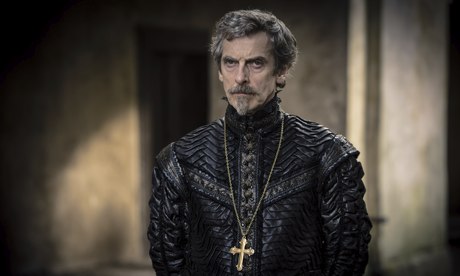It's also a pleasure is to contrast Scott and Dumas's different approaches to what they invented. Scott was an earnest author, who, despite frequent flights of fancy in his poetry, seldom left unconsidered within his tale-spinning, the impact of the past upon the present, for good or for bad. Scott was always hoping for reconciliation among oppositions. Dumas, an author concerned with the nakedness of political power, however, accomplished what writers to this very day, particularly in the U.S., attempt so hard to emulate, while seldom if ever living up to their inspiration, that deft, precise, lightness of touch, tone, style and speech, for which particularly The Three Musketeers is famous.* What USians writers in particular lack in their attempts to emulate Dumas is what feels eminently French, which is best described in a term from ballet -- the vocabulary of which, like the form, is also classically French -- ballon.
In this light, the BBC1, ten-part production of The Three Musketeers should be interesting: will the ballon remain among the promised filth and grit?
 |
| Peter Capaldi plays the arch-schemer, Cardinal Richelieu |
The 10-part drama, which will begin next month and appears destined for a Saturday-night slot, is a modern take on the Alexandre Dumas tale without doing what its writer Adrian Hodges described as the "full Sherlock".
The feathers and the tabards are gone – fans of the 1973 Richard Chamberlain film will be disappointed – and in their place is a world that is a "bit smelly, a bit dirty", said Hodges. "But it's still about heroes," he said. "There are lots of anti-heroes on TV, and there is always room in the world for heroes."
. . . . Hodges' updating includes a mixed-race Porthos, played by newcomer Howard Charles. "He was born in the 'court of miracles', the 17th-century version of the ghetto," said Charles. A long roll call of guest stars includes Vinnie Jones, Tara Fitzgerald, Ashley Waters, John Lynch and Sean Pertwee.
Unusually for a story about the musketeers perhaps, it also features a number of prominent roles for women. "In modernising the series, we wanted the women to be as equally powerful and impressive as the men," Jessica Pope, its executive producer, said.----------------
* Did Dumas invent swashbuckling in his Three Musketeers, set in the 17th century, serialized March - July 1848?
Before deciding we might consider Scott's verses, "Young Lochinvar," embedded in his epic poem, Marmion about the 1513 Battle of Flodden Field. Marmion was published in 1808. Agree or disagree: Young Lochinvar is not swashbuckling, though it is heroic and adventurous, in the Romantic style.


2 comments:
In the meantime the reviews of the first ep of the adaptation of the Jane Austen bite by P.D. James, Death Comes to Pemberly, have been coming in. The audience appears about evenly divided between being bored and annoyed to death, to unthinking approval. The reviewer in the Guardian thought it was a wonderful mash-up. Argh.
Love, C.
While the reviews I've seen of Downton Abbey's Christmas Special have been uniformly snarky, sneering, snide and smirky.
Love, C.
Post a Comment